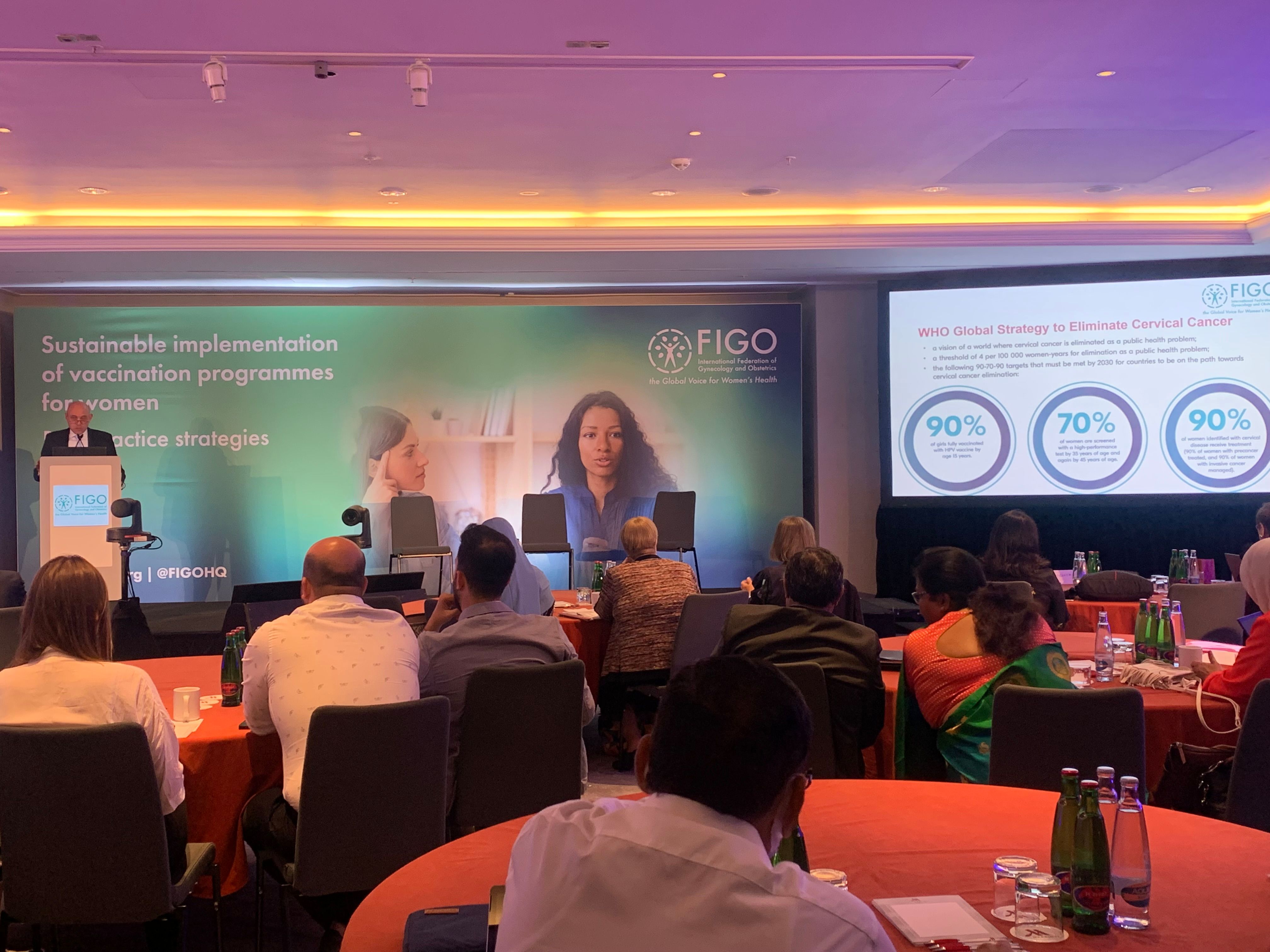FIGO-led workshop to identify barriers and solutions to the sustainable implementation of vaccination programmes
From Monday 4 to Wednesday 6 July 2022, FIGO welcomed more than 40 participants in Prague to take part in a workshop to identify and collate best current practices in the implementation of global guidance on vaccination programmes for women.

The workshop was organised by an inter-committee FIGO working group with the objective of identifying specific barriers to the implementation of current World Health Organization (WHO) guidelines on vaccination programmes for women, including the WHO 2020 Global Strategy for the Elimination of Cervical Cancer.
Structured around two focus topics – HPV vaccination for the prevention of cervical cancer and vaccination during pregnancy – the workshop brought together individuals and organisations from across regions and sectors, including local and international NGOs, FIGO member societies, divisions and committees, social and policy researchers, national government representatives and frontline clinicians. More than 40 participants joined the in-person meeting in Prague, Czech Republic, with an additional 10 speakers contributing remotely, and over 200 individuals who had registered to watch the online livestream.
The workshop will ultimately lead to the preparation and dissemination of best practice advice for the implementation of vaccination programmes for women, with input from workshop participants.
It was great to meet colleagues, interact with the knowledgeable faculty and make wonderful new friends. I look forward to attending such wonderful, interactive, practical and educative workshops and conferences organised by FIGO in the future.
– Prof Krishnendu Gupta, project lead for FIGO Pilot Grant Integration of Smartphone in cervical cancer screening and Vaccination with Education dissemination (i–SERVE), Kolkata, India
Starting the workshop: keynote speaker and first panel discussions
To open the first day, FIGO had the honour of welcoming Dr Princess Nothemba Simelela, Assistant Director-General for Strategic Priorities (Cervical Cancer Elimination) at the WHO, to deliver a keynote presentation, “Getting on the path to eliminate cervical cancer”. This was followed by presentations introducing the foundations of vaccination programmes for women from FIGO’s President, Dr Jeanne Conry, Prof Eliana Amaral, Chair of FIGO’s Committee on Infections during Pregnancy and Prof Pius Okong, Chair of FIGO’s Committee on Health Systems Strengthening.
The next session focused on vaccine immunology with virtual contributions from Prof Margaret Stanley and Prof Joakim Dillner, who also joined Prof Amaral and Dr Omu Anzala, Director of the KAVI-Institute of Clinical Research in Nairobi, for a hybrid panel and Q&A session chaired by Dr Partha Basu, Acting Head of Early Detection, Prevention & Infections Branch at the International Agency for Research on Cancer (IARC/WHO). To close day one, Prof Neerja Bhatla, from FIGO’s Committee on Women’s Cancer and Dr Linda Eckert offered insights into the role of both HPV vaccination and its allied strategies, including HPV-based screening, in the WHO’s Global Strategy for Elimination of Cervical Cancer.
Day 2: global perspectives on vaccination programme implementation
On Tuesday, speakers with experience of vaccine strategy implementation from various countries including Australia, Brazil, Colombia, India, Japan, Kenya, Nigeria and Rwanda reflected on successes, challenges and “lessons learned” from specific case studies of HPV vaccination strategies and strategies for vaccination during pregnancy, with particular attention to barriers in low- and middle-income countries. The FIGO Committee on Ethical Aspects of Human Reproduction and Women’s Health held a session on ethical issues relating to access and knowledge of vaccine availability and use, which was followed by a special session exploring methods for dealing with anti-vaccination misinformation in women’s health.
The presentations were followed by interactive discussions and Q&As, with panel participants representing organisations such as RAiSE Foundation Nigeria, End Cervical Cancer Nigeria Initiative (ECCNI), World Association of Trainees in Obstetrics and Gynecology (WATOG), International Paediatric Association (IPA) and grant recipients from FIGO’s Pilot Project to Eliminate Cervical Cancer.

Discussion groups: exploring ways forward
On days two and three, participants convened into six discussion groups that were each assigned a focus area – either HPV vaccination or vaccination during pregnancy – and a specific question or issue. These included: strategies for the acceleration of the adoption and maintenance of vaccination (considering all income levels and settings); issues in medical training, health systems and public health to successfully sustain vaccination; and best practice for preventing, addressing and reversing misinformation for vaccination for women. Led by a facilitator, each group discussed the major issues relating to their question, explored best practice strategies to address these and looked ahead to where future research or action should be focused.
On the final day, a representative of each group presented their summary best practice recommendations, including areas for future research and remaining barriers, for wider discussion and questions from the plenary group.
As a young Turkish female physician, my first FIGO meeting was absolutely fantastic. My main motivation to join this workshop was to improve my knowledge of HPV vaccination and of research implementation for cervical cancer elimination for my master thesis in Global Health. Not only did I exceed my own expectations, but I also met with FIGO experts and other delegates from around the globe. We were all instantly united at a professional level and also became good friends to achieve one specific goal: "cervical cancer elimination''. I am sure we will meet again in the future as we all share the same passion of making our world a better place for all women.
– Esra Bilir, MD, MSc Researcher, Department of Gynecologic Oncology, Koç University School of Medicine, Istanbul, Turkey
Resources from the workshop
The livestream recording (available in English) will be made available online shortly. Please keep an eye out for this announcement across FIGO’s digital channels.